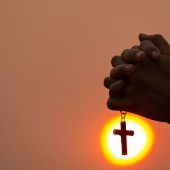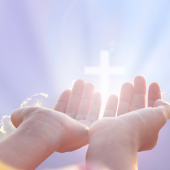Divine Restoration

February 19, 2025 Wednesday of the Sixth in Ordinary Time
Daily Readings: Genesis 8:6-13, 20-22; Mark 8:22-26
The biblical narratives of Noah and the blind man of Bethsaida converge in their revelation of God’s patient work to restore a fractured world. In Genesis, Noah releases birds to probe the receding floodwaters—a cautious search for signs of renewal. The dove’s return with an olive branch becomes a fragile emblem of hope, a covenant emerging from devastation. Similarly, in Mark’s Gospel, Jesus heals a blind man in stages: the man’s initial blurred vision (“people like trees walking”) mirrors humanity’s struggle to grasp divine truth. Both stories reject immediacy, instead framing restoration as a gradual, participatory process.
These accounts reflect God’s pedagogy amid brokenness. The flood, a divine response to human corruption, resets creation but does not erase sin’s stain. Noah’s meticulous testing of the waters—waiting, watching, discerning—parallels the disciples’ (and our own) halting journey toward spiritual clarity. Just as the blind man’s partial sight signifies incomplete understanding, Noah’s tentative hope after the olive branch speaks to faith’s incremental nature. Divine restoration is neither swift nor simplistic; it unfolds in the tension between judgment and mercy. Noah’s post-flood sacrifice acknowledges grace amid ruin—a ritual of gratitude and covenant. Likewise, the blind man’s full healing symbolizes the clarity of vision found in Christ.
Both narratives reject the notion of redemption as spectacle. The burnt offering’s “pleasing aroma” and the man’s restored sight are not endpoints but invitations into deeper relationship. God’s work is iterative: He sows renewal in the soil of human cooperation, nurturing faith through uncertainty.
These readings remind us that divine restoration is a pilgrimage, not an event. In a world still shadowed by brokenness, God meets us in partial sight and tentative hope, guiding us toward wholeness. They call us to lean into the slow, sacred work of becoming—trusting that the God who began renewal in Noah’s ark and a blind man’s eyes will bring it to completion.
A Call to Action for Catholic Living: Trust in God’s patient work of restoration. Walk in faith, embrace the journey, and allow Him to bring you to wholeness.
Radio Veritas Asia (RVA), a media platform of the Catholic Church, aims to share Christ. RVA started in 1969 as a continental Catholic radio station to serve Asian countries in their respective local language, thus earning the tag “the Voice of Asian Christianity.” Responding to the emerging context, RVA embraced media platforms to connect with the global Asian audience via its 21 language websites and various social media platforms.














